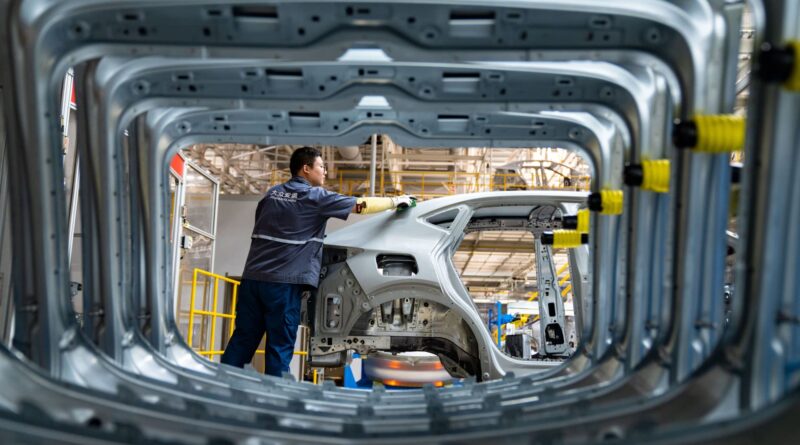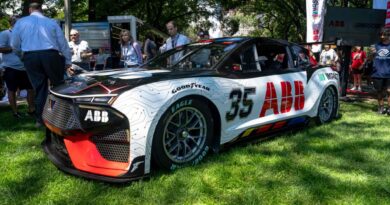Auto giants are getting nervous concerning the prospect of large fines
Staff producing pure electrical autos at a Volkswagen (Anhui) workshop in Hefei, China, on Sept. 25, 2024.
Cfoto | Future Publishing | Getty Pictures
Europe’s high automotive giants seem like more and more involved concerning the prospect of large fines, notably as electrical car demand falters forward of the following tightening of carbon rules.
Automakers working in Europe face stricter emission targets from subsequent 12 months because the EU cap on common emissions from new autos gross sales falls to 93.6 grams of CO2 per kilometer (g/km), reflecting a 15% lower from a 2021 baseline of 110.1 g/km.
Exceeding these limits — which have been agreed in 2019 and type a part of the 27-nation bloc’s ambition to succeed in climate neutrality by 2050 — can lead to hefty fines.
Rico Luman, senior sector economist for transport and logistics at Dutch financial institution ING, mentioned Europe’s carmakers had each motive to be involved concerning the scale of the monetary penalties.
“The fines are large truly. If you calculate it … it simply involves many tens of millions primarily based on the volumes they produce,” Luman instructed CNBC through videoconference.
Renault CEO Luca de Meo mentioned final month that if EV gross sales stay at present ranges, the European auto {industry} might should pay 15 billion euros ($16.5 billion) in monetary penalties or hand over the manufacturing of over 2.5 million autos, Reuters reported, citing an interview with French radio.
The European Vehicle Producers’ Affiliation, or ACEA, says the {industry} is lacking “essential circumstances” to help the zero-emission transition, “with issues about assembly the 2025 CO2 emission discount targets for vehicles and vans on the rise.”
The automotive foyer group, which represents the likes of BMW, Ferrari, Renault, Volkswagen and Volvo, warned that the EU’s present guidelines “don’t account for the profound shift within the geopolitical and financial local weather” in recent times.
“European auto producers, united in ACEA, subsequently name on the EU establishments to come back ahead with pressing reduction measures earlier than new CO2 targets for vehicles and vans come into impact in 2025,” ACEA mentioned in a press release revealed Sept. 19.
Tim McPhie, a spokesperson for the European Fee, the EU’s government arm, said in a press briefing late final month that the auto {industry} nonetheless has 15 months to fulfill the brand new targets, including it’s “too quickly to invest” on the dimensions of the potential fines.
“We now have designed these insurance policies in a method that the {industry} has time to adapt, that the general financial ecosystem has time to adapt however, after all, we’re delicate to the challenges which are being confronted,” McPhie mentioned on Sept. 24.
‘An enormous battle’
Europe’s high automakers are contending with a perfect storm of challenges on the trail to full electrification, together with a scarcity of reasonably priced fashions, a slower-than-anticipated rollout of charging factors and the potential affect of European tariffs on EVs made in China.
Crisis-stricken Volkswagen and several other different carmakers, together with Ford and Mercedes-Benz Group, have all announced plans to delay earlier targets to part out gross sales of inside combustion engine (ICE) autos in Europe.
“Producers are just about centered on typical hybrids and ICE autos as a result of they’re much extra worthwhile,” ING’s Luman mentioned.
“In the long term, they should compete with the brand new gamers and restructure their organizations by making the shift to the transition however that is not that worthwhile within the quick run,” he continued. “So, that is a large battle.”
An EnBW electrical automotive charging station close to Weissenfels, Germany.
Sean Gallup | Getty Pictures Information | Getty Pictures
The ACEA says that the EU’s battery electrical market share has fallen to 12.6% this 12 months, down from 13.9% in 2023, whereas the bloc’s automotive gross sales stay round 18% decrease than pre-pandemic ranges in 2019.
Xavier Demeulenaere, affiliate director of sustainable mobility at S&P World Mobility, mentioned all of Europe’s unique gear producers (OEMs) have a “sturdy incentive” to spice up their very own EV gross sales to decrease their common fleet emissions and adjust to the regulated goal.
“The slowdown in electrification we’re seeing in 2024, attributable to a worsening financial scenario throughout Europe and the removing or discount of subsidies in some nations, makes the scenario difficult for many OEMs because it creates a requirement challenge,” Demeulenaere instructed CNBC through phone.
“But when demand shouldn’t be there, pooling stays one of many most important mechanisms to mitigate as soon as once more these potential monetary penalties which are anticipated in 2025,” he added.
Pooling refers back to the course of by which automotive producers workforce as much as be thought of as one entity when calculating their efficiency towards a CO2 emissions goal.
Disaster? What disaster?
Not everyone seems to be satisfied that the gross sales problem that Europe’s automotive {industry} faces constitutes an industry-wide disaster.
Marketing campaign group Transport & Surroundings said in an evaluation revealed Wednesday that the present state of play ought to as a substitute be thought of a “transitional part” by which producers adapt to new rules and altering EV market dynamics.
A manufacturing line at a Renault plant in Slovenia, Europe.
Bloomberg | Bloomberg | Getty Pictures
Analysts at Transport & Surroundings mentioned the European automotive {industry} has had since 2019 to plan for subsequent 12 months’s CO2 goal and producers can keep away from having to pay giant fines by promoting extra hybrids and extra fuel-efficient vehicles.
“Carmakers additionally profit from flexibilities within the regulation that additional (artificially) decrease their CO2 emissions, in addition to the choice to pool their emissions with different carmakers,” they added.
“The worthwhile European carmakers might have to promote fewer large polluting SUVs, however then that’s the intention of the automotive CO2 regulation.”
Highway transport is the main contributor to move emissions of CO2 within the EU, with passenger vehicles and light-weight industrial autos accounting for almost 15% of whole emissions.





